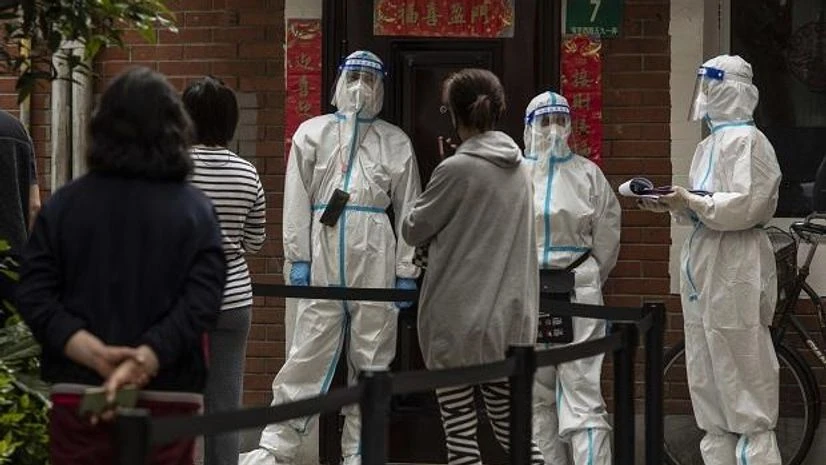As the situation in Shanghai threatens to spiral out of control in its battle against Covid-19, China's capital Beijing has been hit by a surge in infections with alarmed residents lining up at supermarkets and provision stores struggling to control crowds as people try to stock up to prevent Shanghai-type shortages.
Though the media focus shifted from Shanghai to Beijing, there was nothing to point at a let up in the cases in China's financial capital.
The hub of international trade and major port has been found grappling on several fronts in echoes of the early days of the epidemic when Wuhan became the epicentre of the affliction.
Social media posts put out by Shanghai residents suffering under weeks of lockdown and food shortages have come under attack by overzealous Chinese censors who want to send a message of "normalcy" amid an undercurrent of tension among citizens, sources in the city said.
A Shanghai health official told a press briefing that the pandemic is still developing at a "high level" as the city of 25 million recorded more than 2,000 fresh cases and over 39 new deaths.
The state-run Global Times reported that construction sites are seeing cluster infections amid the outbreak that has seen food shortages and sporadic protests.
Zhang Dandan, deputy director of Shanghai Municipal Health Commission, told a press briefing that the epidemic is fluctuating at high levels with cluster infections at some construction sites and enterprises increasing amid business resumption, despite the fact that coronavirus infections at community level are dropping and more patients are being discharged from hospitals.
More From This Section
A Shanghai resident told IANS on condition of anonymity that she was exchanging supplies with her neighbors, implying that there was no shortage as such. Life has to go on, she said.
On the other hand, Beijing's Chaoyang district, which is home to about 3.5 million residents, has started mass nucleic acid tests for people living and working in the district.
Beijing reported 29 confirmed Covid-19 cases on Monday, taking the total number of infections to 70 since April 22.
Besides cluster infections in a middle school in Chaoyang, the largest district in Beijing, some cases were found at dinner parties.
The transmission routes of this round of flare-ups had been identified, according to officials at a press conference on the epidemic situation in Beijing held Monday morning.
Though residents in Beijing seemed largely calm about the situation, an undercurrent of tension was still palpable.
On the condition of anonymity, a former Beijing resident told IANS that the capital could do better than Shanghai in controlling what is seen to be a flare-up.
"But after what has happened in Shanghai, I won't be surprised if things in Beijing turn out to be worse," said the man who lived in Beijing for eight years before moving abroad.
An administrative quirk is that Beijing's local government needs to consult the central government on policy matters.
However, Shanghai is free to make its own policy and need not seek the central government's permission or advice.
--IANS
mukesh/ksk/
(Only the headline and picture of this report may have been reworked by the Business Standard staff; the rest of the content is auto-generated from a syndicated feed.)

)
